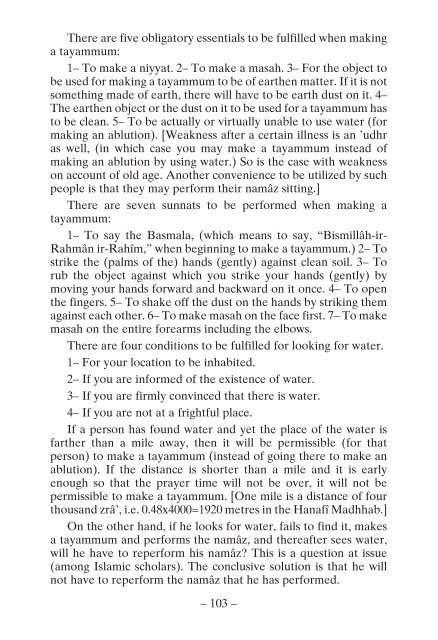Miftah-ul-Janna (Booklet for way to Paradise)
You also want an ePaper? Increase the reach of your titles
YUMPU automatically turns print PDFs into web optimized ePapers that Google loves.
There are five obliga<strong>to</strong>ry essentials <strong>to</strong> be f<strong>ul</strong>filled when making<br />
a tayammum:<br />
1– To make a niyyat. 2– To make a masah. 3– For the object <strong>to</strong><br />
be used <strong>for</strong> making a tayammum <strong>to</strong> be of earthen matter. If it is not<br />
something made of earth, there will have <strong>to</strong> be earth dust on it. 4–<br />
The earthen object or the dust on it <strong>to</strong> be used <strong>for</strong> a tayammum has<br />
<strong>to</strong> be clean. 5– To be actually or virtually unable <strong>to</strong> use water (<strong>for</strong><br />
making an ablution). [Weakness after a certain illness is an ’udhr<br />
as well, (in which case you may make a tayammum instead of<br />
making an ablution by using water.) So is the case with weakness<br />
on account of old age. Another convenience <strong>to</strong> be utilized by such<br />
people is that they may per<strong>for</strong>m their namâz sitting.]<br />
There are seven sunnats <strong>to</strong> be per<strong>for</strong>med when making a<br />
tayammum:<br />
1– To say the Basmala, (which means <strong>to</strong> say, “Bismillâh-ir-<br />
Rahmân ir-Rahîm,” when beginning <strong>to</strong> make a tayammum.) 2– To<br />
strike the (palms of the) hands (gently) against clean soil. 3– To<br />
rub the object against which you strike your hands (gently) by<br />
moving your hands <strong>for</strong>ward and backward on it once. 4– To open<br />
the fingers. 5– To shake off the dust on the hands by striking them<br />
against each other. 6– To make masah on the face first. 7– To make<br />
masah on the entire <strong>for</strong>earms including the elbows.<br />
There are four conditions <strong>to</strong> be f<strong>ul</strong>filled <strong>for</strong> looking <strong>for</strong> water.<br />
1– For your location <strong>to</strong> be inhabited.<br />
2– If you are in<strong>for</strong>med of the existence of water.<br />
3– If you are firmly convinced that there is water.<br />
4– If you are not at a frightf<strong>ul</strong> place.<br />
If a person has found water and yet the place of the water is<br />
farther than a mile a<strong>way</strong>, then it will be permissible (<strong>for</strong> that<br />
person) <strong>to</strong> make a tayammum (instead of going there <strong>to</strong> make an<br />
ablution). If the distance is shorter than a mile and it is early<br />
enough so that the prayer time will not be over, it will not be<br />
permissible <strong>to</strong> make a tayammum. [One mile is a distance of four<br />
thousand zrâ’, i.e. 0.48x4000=1920 metres in the Hanafî Madhhab.]<br />
On the other hand, if he looks <strong>for</strong> water, fails <strong>to</strong> find it, makes<br />
a tayammum and per<strong>for</strong>ms the namâz, and thereafter sees water,<br />
will he have <strong>to</strong> reper<strong>for</strong>m his namâz? This is a question at issue<br />
(among Islamic scholars). The conclusive solution is that he will<br />
not have <strong>to</strong> reper<strong>for</strong>m the namâz that he has per<strong>for</strong>med.<br />
– 103 –

















